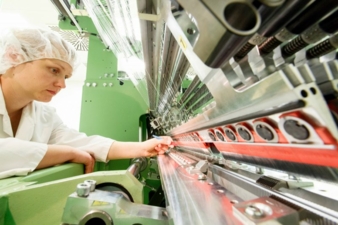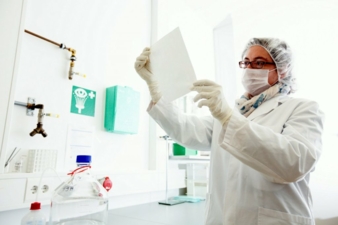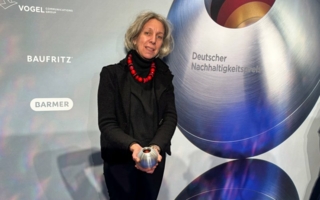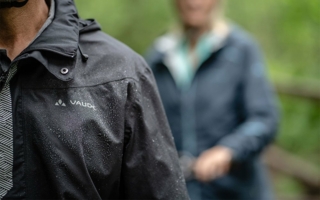12/09/2019 – Closing the gap and avoiding the ‘valley of death’ — auf Deutsch lesen
ITV Produktservice GmbH, Denkendorf
Most of the sixteen German textile research institutes formed research and production companies some years ago – including Denkendorf.
What do the institutions themselves get out of this and what do their customers say? Our four-part series provides answers from Aachen, Denkendorf, Greiz and Rudolstadt.
Bespoke implants
The German Institutes of Textile and Fibre Research, or DITF for short, are based in Denkendorf near Stuttgart and have their own large limited production company. This seems perfectly logical given the significance and clout of what is Europe’s biggest textile research location. ITV Produktservice GmbH, as the company is called, is a global player specialising in the development and OEM production of high-quality (mostly textile) medical products for clinical applications. Many of the innovations developed here in collaboration with the neighbouring DITF and industry partners, are already in use around the world. The list includes surgical suture materials and tapes, vascular prostheses, stents for the trachea and oesophagus, hernia meshes and polymer membranes for treating the most serious burns.
Implant for intervertebral disc patients
In cooperation with the Catalonian company NEOS Surgery, the DITF/ITVP research and production duo succeeded in 2017 in developing an implant which is likely to be of significant interest to patients suffering from slipped discs. The product is currently being tested on animals. The woven textile innovation, which closes the damaged disc from within, will be launched on the market in the near future, on completion of extensive tests. The ITVP will take on the role of production partner.
These and other creations, which are often the result of teamwork with the DITF’s Head of Biomedical Engineering, Prof. Dr. Michael Doser, are the company’s “bread and butter”. Take the knot-free barbed sutures, for example. Depending on the specification, these sutures consist of a material that can be absorbed by the body in the short or medium term. They are also designed with barbs eradicating the need for knots at the wound which enhances the healing process.
Dr. Sven Oberhoffner, Authorised Officer ITVP GmbH:
“Customers particularly from Asia have a great demand for the material, which is widely used for cosmetic procedures such as face lifts.” Over the years, the facility in Denkendorf has seen its machines churn out “several million metres” of the absorbable suture material.
Working within its remit, the ITVP offers customers a wide spectrum of possible product developments – e.g. medical implants and upstream products along the development and production chain, including textile structures, injection moulded parts, films and membranes. The spectrum also embraces high-strength textiles for use in orthopaedics and absorbable materials, such as the mesh employed in breast reconstruction. The list also features anti-inflammatory textile implants.
In many aspects of its work, the limited company under the wing of the DITF fosters a reciprocal relationship with the association of institutes. Accordingly, where public research has provided the main initial stimulus, the firm can be instrumental in translating ideas into an industrial context. In the case of publicly funded projects, the ITVP can function as an industrial partner – providing an all-round solution nearby.
“A proportion of the revenue generated is ploughed back into the DITF’s research,” states Dr. Oberhoffner. On occasion, the ITVP also adds to the DITF’s own turnover, for example, by awarding required product tests to the DITF testing laboratory.





